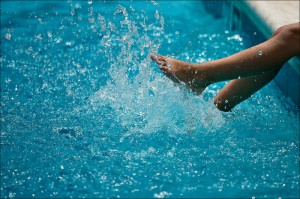 A couple of weeks ago in the gym locker room I averted my eyes as a young woman aided her grandmother, a stroke victim. She removed the older woman’s clothes and underwear, and helped her put on a swimsuit. The grandmother could not speak; her face remained still. She had to be lifted, naked, from a wheelchair, to a chair, and then back during the entire change of clothes. After settling the elderly woman, the granddaughter disappeared momentarily, and I dared to look at the grandmother’s frozen face.
A couple of weeks ago in the gym locker room I averted my eyes as a young woman aided her grandmother, a stroke victim. She removed the older woman’s clothes and underwear, and helped her put on a swimsuit. The grandmother could not speak; her face remained still. She had to be lifted, naked, from a wheelchair, to a chair, and then back during the entire change of clothes. After settling the elderly woman, the granddaughter disappeared momentarily, and I dared to look at the grandmother’s frozen face.
For a moment I imagined myself sitting in that chair, in that locker room, naked and unable to hide. I shuddered and hurried to change out of my own suit and leave.
Growing up an uncoordinated asthmatic, I was self-conscious about my body. I feared looking foolish in front of my peers, so I avoided trying new activities and instead, mastered the things I was already good at rather than risk exposing my weakness.
I’d shrug my shoulders if I received a compliment. “It’s just easy for me,” I’d say.
Which was true, I only attempted goals that I knew I could accomplish. I steered carefully around activities I didn’t know how to do. Playing exclusively to my strengths meant I received praise.
It also meant I didn’t really know how to swim. I grew up dog paddling and hanging out near the sides of pools on floats or treading water—but hiding this particular inability was stressful.
So when I discovered that my university offered Beginning Swimming 2, Introduction to Deep Water, I signed up for the class.
I didn’t need to tell any one it was for beginners.
Pale, with my thick locks pulled into a failing ponytail, and wearing my towel like a bathrobe, I waited on gym bleachers with twenty other students.
When the professor walked in—tan and muscular, with curly brown hair, shirtless, and wearing board shorts that drooped to Abercrombie and Fitch standards, I almost walked out. But I had sat on the far end of the bleachers—I couldn’t get to the door without further exposure.
Our half-naked professor made us swim one pool length, twenty-five meters, and told us we could get to the other side in whatever fashion we chose. One of my classmates, a Ph.D. student fifteen years my senior, with short red hair, tattoos up and down her arms, and a vocabulary straight off a fishing boat dog paddled down the lane, cursing the entire time.
“I’m going scuba diving in the Caribbean when I finally finish my goddamned dissertation,” she yelled above her own splashes.
I nodded and made the decision to try—even though I might fail. And while our professor rarely wore a shirt all semester, we each passed our final exam and swam a mile.
Since then I have been swimming laps. I swam before my wedding to make sure I could fit into my dress. I swam during my pregnancy to combat gestational diabetes. I swim now when I’m stressed, when things aren’t going well with my family, when I need to clear my head.
When I put my face in the water I don’t feel like I have to be good at anything. Despite the lessons learned in the pool, swimming is the only activity that I do voluntarily, knowing that I do it poorly. I have eliminated every other thing—every other possibility—so that I can put a face in front of the world that looks controlled.
My release is to put that same face in the water.
It’s when I come up for air, however, that I see those around me.
An elderly woman in the next lane attempts to breaststroke without putting her head under—her pale powdered makeup remaining completely intact, saving her hairdo until her next trip to the beauty shop.
A paraplegic man with legs amputated just above the knee lowers himself from his wheelchair using his arms, muscular and hairy, then speeds past me despite his inability to kick.
A middle-aged woman with facial scarring waves cheerily and then lies on her back, floats, and twirls her forearms at the elbows like miniature propellers.
All of us are in the pool together. And despite our practice in the water, we’re foreign. We don’t have gills or fins. We are neither broad-shouldered nor powerful. Totally and utterly ill-fit for the environment, we swim anyway.
And I think if you asked the Ph.D. student, the paraplegic, the trauma survivor, the stroke victim, even my shirtless, abdominal-muscled, swimming professor, we would acknowledge that this watery world is not where we are supposed to be.
But it is where we are.
Someday, my granddaughter may have to help me to put on my underwear in a crowded room. I may need to greet others cheerfully after a trauma. I may lose something that can’t be replaced.
Hiding my vulnerabilities is risky, pretending I don’t have them is a lie. More importantly, veiling my weakness does not extend grace to others.
This year I pray that I may love graciously in spite of weakness—to live the truth, and not just tell it.
Jesus loves me, this I know.
For the Bible tells me so.
Little ones to him belong.
I am weak, but he is strong.











